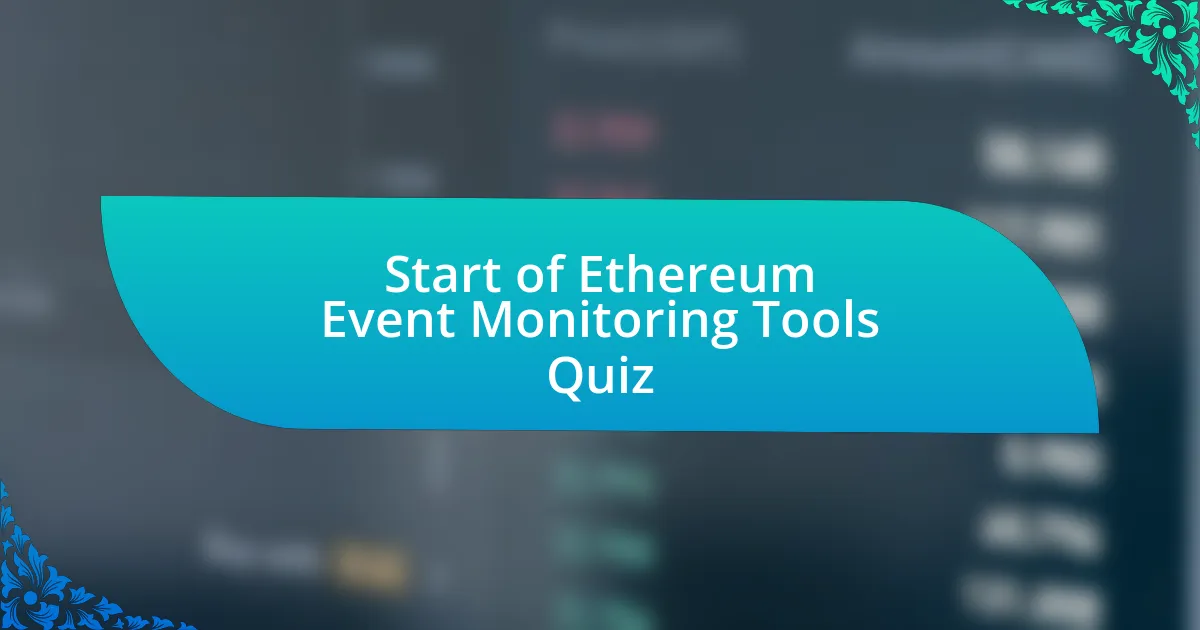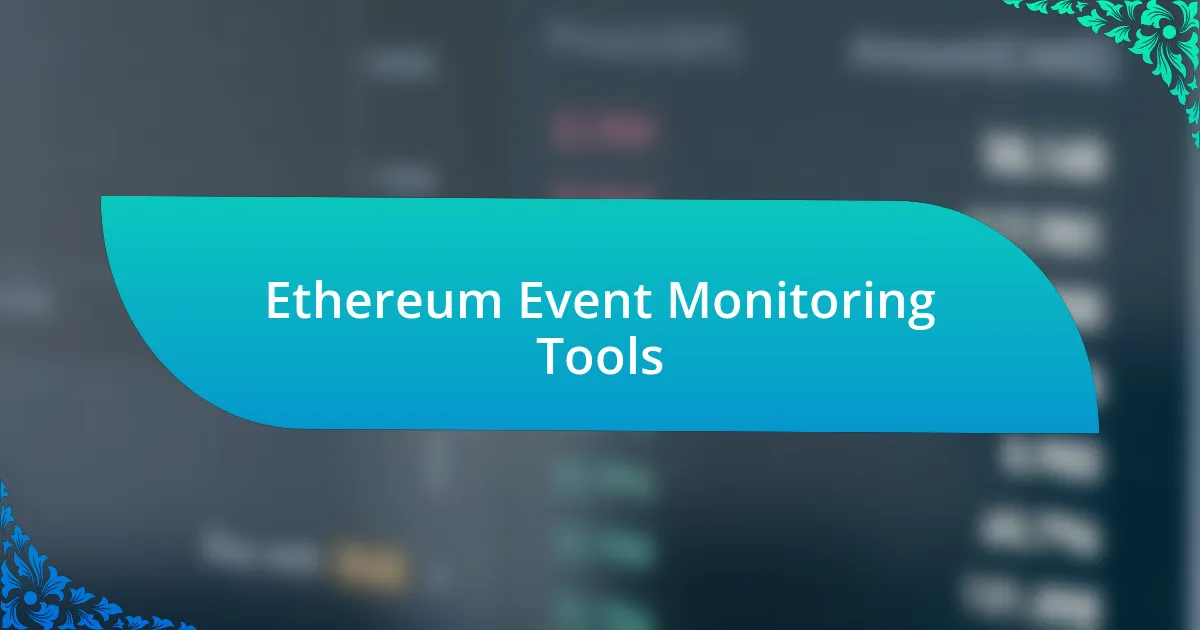
Start of Ethereum Event Monitoring Tools Quiz
1. What is the primary function of Ethereum event monitoring tools?
- Creating new smart contracts
- Processing transactions in a wallet
- Mining new Ethereum blocks
- Tracking events emitted by smart contracts
2. How are events emitted by smart contracts on Ethereum tracked?
- Events are not tracked by any mechanism.
- Events are stored in the transaction receipt trie.
- Events are stored in an internal database.
- Events are sent directly to the user interface.
3. What is the structure that contains Ethereum event logs?
- Transaction Receipt Trie
- Smart Contract Registry
- Block Header
- Gas Limit Table
4. Which tool allows users to search for specific Ethereum transactions and contracts?
- Etherscan
- BlockScout
- TrueBlocks
- Remix
5. What is the advantage of using BlockScout for Ethereum event tracking?
- Offline data storage only
- Exclusive paid subscription required
- Limited to private networks
- Open-source access to event data
6. How does TrueBlocks facilitate Ethereum data retrieval?
- TrueBlocks simplifies Ethereum mining processes with new algorithms.
- TrueBlocks provides automated access to Ethereum data.
- TrueBlocks tracks physical currency movements in Ethereum.
- TrueBlocks is a centralized database for collecting Ethereum transactions.
7. In what scenario would Ethereum-Event-Scan be particularly useful?
- To build mobile applications
- For monitoring events on private chains
- To convert Ethereum to Bitcoin
- For sending emails securely
8. What programming language is commonly used for tracking Ethereum events?
- Ruby
- JavaScript
- Go
- C++
9. What issue does a redundant event listener solve in event handling?
- Prevents duplicate event processing
- Increases transaction fees
- Enhances data encryption
- Reduces network latency
10. What method can be employed to prevent the processing of duplicate Ethereum events?
- Utilize a third-party data analysis tool
- Use a set to track seen events
- Store events in a local database
- Implement a logging system for errors
11. How does `asyncio` enhance event processing in Python for Ethereum?
- asyncio blocks all other events until processing ends.
- asyncio simplifies smart contract creation without event handling.
- asyncio only enhances transaction speeds on the blockchain.
- asyncio allows concurrent connections and event processing.
12. Why is the `event_filter` essential in monitoring smart contract events?
- The `event_filter` compresses event data for faster access.
- The `event_filter` converts events into human-readable formats.
- The `event_filter` disables monitoring to save resources.
- The `event_filter` captures specific events in real-time.
13. What is the process for validating Ethereum event logs in a frontend application?
- Rely on user submissions for contract event data.
- Monitor the Ethereum blockchain through manual inspection.
- Recalculate the receipts hash and compare it with the block header`s ReceiptsHash.
- Use a centralized server for event log validation.
14. What occurs to a transaction if its associated gas runs out?
- All state changes are reversed.
- The gas is refunded to the sender.
- The transaction is queued for future execution.
- The transaction is permanently completed.
15. What recovery method is available for accessing an Ethereum account without a private key?
- Public address verification
- 12-word mnemonic phrase
- Password recovery email
- 2-factor authentication code
16. What is the primary purpose of using Ethereum Testnet for developers?
- Create real Ether without costs
- Test software in a risk-free environment
- Gain higher transaction speeds for projects
- Ensure maximum security of personal funds
17. Can users keep transactions confidential on Ethereum?
- Yes, users can hide their transactions easily.
- No, transactions on the Ethereum network are public.
- Only certain transactions can be kept confidential.
- All users have the option to make transactions private.
18. What are the available methods for connecting to an Ethereum node?
- HTTP-RPC
- WS-RPC
- FTP-RPC
- SMTP-RPC
19. How does Geth`s fast sync improve blockchain synchronization?
- Geth’s fast sync only syncs the latest state without transactions, causing data loss.
- Geth’s fast sync requires downloading every block in chronological order, which slows down the process.
- Geth’s fast sync eliminates the need for network nodes, creating a standalone blockchain.
- Geth’s fast sync downloads only the necessary transactions, making the synchronization process quicker.
20. What is Remix primarily used for in the Ethereum development environment?
- Conducting token sales
- Deploying and testing smart contracts
- Creating Ethereum wallets
- Mining new Ethereum blocks
21. What costs are associated with state-modifying actions in smart contracts?
- Actions that suspend transactions incur processing fees.
- Actions that retrieve data incur network fees.
- Actions that modify contract state incur gas costs.
- Actions that read blockchain history incur storage costs.
22. How do Ethereum and Bitcoin differ in their approach to state checking?
- Ethereum checks the latest state for account balances.
- Bitcoin checks for unspent transaction receipts.
- Ethereum checks unspent transaction outputs (UTXO).
- Bitcoin monitors smart contract events only.
23. What is the significance of an event being emitted from a smart contract?
- It automatically executes additional contracts in real-time.
- It allows off-chain applications to capture and react to on-chain events.
- It ensures smart contracts cannot be modified after deployment.
- It makes all transaction details transparent to the public.
24. How does Ethereum ensure the integrity of event logs and prevent tampering?
- Event logs are part of the blockchain`s Merkle tree.
- Event logs are stored in a separate database.
- Event logs can be modified through consensus.
- Event logs are deleted after block confirmation.
25. What is the role of transaction receipt trie in Ethereum?
- The transaction receipt trie stores event logs from smart contracts.
- The transaction receipt trie handles user account balances.
- The transaction receipt trie manages gas fees for transactions.
- The transaction receipt trie governs the consensus mechanism of Ethereum.
26. How can developers test their smart contracts without using real Ether?
- Use Testnet for testing smart contracts.
- Transact using real Ether for testing.
- Deploy contracts directly on the mainnet.
- Write code without testing for reliability.
27. What is the function of a set in managing seen events in Python?
- To store large amounts of data.
- To prevent duplicate processing.
- To execute functions asynchronously.
- To increase the speed of data retrieval.
28. How does Ethereum`s architecture ensure event logs are tamper-proof?
- Event logs are modified in real-time upon contract execution.
- Event logs are deleted after a certain period for privacy.
- Event logs are stored in the transactions receipt trie, ensuring block integrity.
- Event logs are stored temporarily on user nodes only.
29. What are the implications of processing events with slight delays?
- Delayed processing causes immediate data loss.
- Delayed processing is irrelevant in event handling.
- Delayed processing allows for better resource management.
- Delayed processing enhances the speed of transactions.
30. How can logging be effectively configured for Ethereum event listeners?
- Ignore previously processed events to save resources.
- Connect to an Ethereum node without filters set up.
- Use a redundant event listener to track the events.
- Only log after each transaction is complete.

Quiz Successfully Completed!
Congratulations on finishing the quiz about Ethereum Event Monitoring Tools! We hope you found the questions engaging and informative. By participating, you have deepened your understanding of important concepts related to Ethereum’s ecosystem. You may have learned about different tools available for monitoring events and how they can help developers and users alike in tracking blockchain activities.
Your journey through this quiz might have highlighted the significance of real-time data in the Ethereum network. Understanding these tools can enhance your ability to make informed decisions. From detecting anomalies to managing smart contracts effectively, the insights gained here are invaluable for anyone involved in Ethereum development or investment.
We invite you to explore the next section on this page, where you can find more information on Ethereum Event Monitoring Tools. This additional resource will help you expand your knowledge further. Dive deeper into the practical applications and nuances of these tools, and empower yourself in the ever-evolving world of blockchain technology!

Ethereum Event Monitoring Tools
Introduction to Ethereum Event Monitoring Tools
Ethereum event monitoring tools are software solutions designed to track and analyze events occurring on the Ethereum blockchain. They monitor smart contract interactions, transaction activities, and changes in state. These tools are crucial for developers, investors, and analysts seeking insights into network behaviors, user activities, and overall ecosystem health.
Key Features of Ethereum Event Monitoring Tools
Key features include real-time event tracking, notifications for specific events, and historical data analysis. Many tools offer user-friendly dashboards for visualizing data trends. Some also provide APIs for integrating into other applications, enabling comprehensive data access for custom solutions.
Popular Ethereum Event Monitoring Tools
Popular tools include Etherscan, Infura, and Alchemy. Etherscan is well-known for its rich data analytics and tracking capabilities. Infura and Alchemy offer robust APIs that facilitate easy access to Ethereum data, making them popular among developers building decentralized applications.
Use Cases for Ethereum Event Monitoring Tools
Common use cases involve tracking token transfers, monitoring DeFi activities, and observing contract interactions. Developers use tools for debugging and optimizing smart contracts. Investors track significant transaction patterns for trading decisions, while analysts derive insights into market trends.
Challenges in Using Ethereum Event Monitoring Tools
Challenges include managing data volume due to network activity, ensuring real-time accuracy, and addressing potential issues with data latency. Users must also consider security and privacy aspects when monitoring transactions and events on the public blockchain. Some tools may require technical expertise for optimal use, posing a barrier to entry for non-technical users.
What are Ethereum Event Monitoring Tools?
Ethereum Event Monitoring Tools are software applications that track and analyze events on the Ethereum blockchain. They help developers and users detect specific occurrences, such as smart contract interactions and token transfers. For example, tools like Etherscan or Alchemy allow real-time tracking of transactions and ensure users stay updated on necessary blockchain activity.
How do Ethereum Event Monitoring Tools function?
Ethereum Event Monitoring Tools function by connecting to the Ethereum blockchain through nodes or APIs. They listen for events emitted by smart contracts and log these events for users. For instance, they can monitor specific event signatures defined in smart contracts to notify users when certain conditions are met, enabling swift action.
Where can you find Ethereum Event Monitoring Tools?
You can find Ethereum Event Monitoring Tools on various online platforms and repositories. Sites like GitHub host open-source monitoring tools, while dedicated services such as Etherscan and Infura provide monitoring capabilities through their APIs. These platforms offer user-friendly interfaces for tracking blockchain events.
When should you use Ethereum Event Monitoring Tools?
You should use Ethereum Event Monitoring Tools when you need to track specific activities on the Ethereum blockchain, such as monitoring contract events, analyzing token movements, or ensuring compliance with decentralized applications (dApps). They are essential during initial coin offerings (ICOs) or when managing significant smart contracts to observe interaction patterns.
Who benefits from Ethereum Event Monitoring Tools?
Developers, investors, and analysts benefit from Ethereum Event Monitoring Tools. Developers use these tools to debug and enhance smart contracts. Investors utilize them to track token performance and market movements. Analysts leverage the data for research and reporting on Ethereum-based projects and trends in the blockchain ecosystem.

